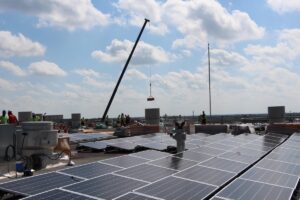Florida leading in sustainability initiatives

The Tampa Electric Company (TECO) is set to begin production on two solar energy projects that are expected to finish sometime next year.
Hillsborough County is taking an important step toward diversifying their sources of energy production, bringing us ever closer to environmental sustainability.
Hillsborough County should continue this kind of investment in order to ensure we can transition away from our fossil fuel dependency. Both TECO’s investments on the county level as well as USF’s investments in the Student Green Energy Fund (SGEF) exemplify the success of transitioning to solar energy.
The additional projects will be paid for through a $1 increase in the energy bills of Hillsborough County citizens.
The project will cost a total of $26.5 million dollars and is projected to save TECO $193 million in fuel costs, as reported by Florida Politics on Oct. 17. This is the kind of strategic planning that simultaneously makes economic sense and addresses environmental issues.
The USF Tampa campus has also made huge strides when it comes to investing in solar energy. The SGEF has demonstrated that USF’s been investing in sustainable energy production since at least 2012.
There are eight different solar energy initiatives that take place right here at USF. Students pass these projects often without even realising it — from discrete solar panels placed on umbrellas at Argos Exchange to panels covering the roof of the Marshall Student Center (MSC), which provide to the MSC the equivalent of powering 39 households annually.
Investing in solar energy has also proven to be a job creator for Florida. As of 2019, there are over 10,000 jobs in the solar industry alone, according to data from the Solar Energy Industries Association.
The only state that has more solar jobs than ours is California, which has over 76,000 solar jobs, so there is still a lot of room for growth.
By investing in these local projects, we can ensure that Florida will continue to lead the country in promoting solar energy and environmental sustainability.
Jared Sellick is a junior majoring in political science.







